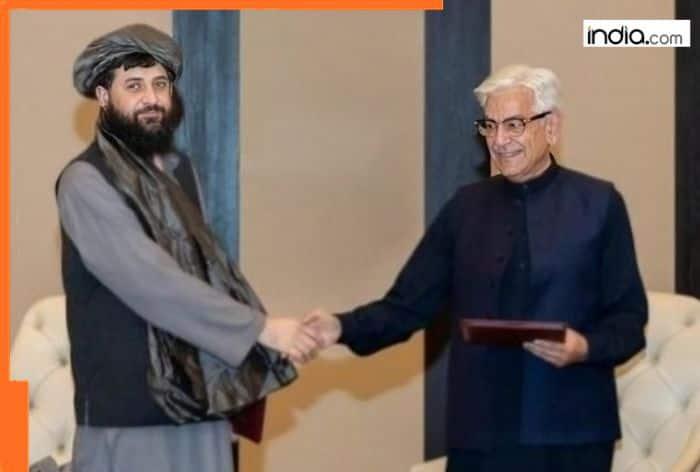Pakistan and Afghanistan agreed to cease hostilities and establish a mechanism for lasting peace, and also made a wide range of important commitments to resolve bilateral disputes, including border issues, ending the week-long Pakistan-Taliban war.

Pakistan-Taliban war: Pakistan and Afghanistan signed a ceasefire agreement after high-level talks between the defence ministers of the two countries, mediated by Qatar and Turkey in Qatari capital Doha. According to Qatar’s Ministry of Foreign Affairs, both sides have agreed to an immediate ceasefire, ending over two weeks of border hostilities that marked the worst crisis between the two countries in recent years.
What was agreed in the Pakistan-Afghanistan ceasefire deal?
As per details, Pakistan and Afghanistan agreed to cease hostilities and establish a mechanism for lasting peace, and also made a wide range of important commitments to resolve bilateral disputes, including border issues.
Under the agreement, Pakistan assured it would not violate Afghanistan’s territorial integrity or attack its civilian and public facilities, while Kabul promised it will not support or shelter terrorist groups, including the Tehreek-e-Taliban Pakistan (TTP), who carry out terror attacks inside Pakistan, Taliban leader Muhammad Suhail Shaheen was quoting as saying.
The negotiators of the two countries would meet again in Turkey for next round of talks, he said.
In a statement, Taliban spokesman Zabihullah Mujahid said both countries have agreed to cease hostile action against each other, and the Afghan Taliban has assured not to support terror groups like TTP, adding that both sides emphasized peaceful dialogue and agreed to set up a joint monitoring mechanism against terror groups with help from Turkey and Qatar.
What did Pakistan say?
Meanwhile, Pakistan Foreign Minister Ishaq Dar lauded the peace agreement even as he reiterated Islamabad’s accusation that Afghanistan was responsible for terror attacks inside his country.
“Welcome the Agreement finalized late last night in Doha. It is the first step in the right direction. Deeply appreciate the constructive role played by brotherly Qatar and Turkiye. We look forward to the establishment of a concrete and verifiable monitoring mechanism, in the next meeting to be hosted by Turkiye, to address the menace of terrorism emanating from Afghan soil towards Pakistan. It is important to put all efforts in place to prevent any further loss of lives, said Dar, who also serves as Pakistan’s Deputy Prime Minister.
Earlier in the day, Pakistan Prime Minister Shehbaz Sharif, during a telephonic conversation with his Malaysian counterpart Anwar Ibrahim, pointed the blame at Afghanistan for the recent cross-border escalations.
Sharif said Pakistan has agreed to a ceasefire at the behest of Afghanistan and asked for tangible actions against terrorists, according to a statement from the Pakistan Prime Minister’s Office.
“The Prime Minister also apprised his Malaysian counterpart of the security situation along the Pakistan-Afghanistan border. He underscored that Pakistan seeks peace and stability in Afghanistan but continues to face cross-border terrorism emanating from Afghan soil. The Prime Minister emphasized that the Afghan authorities must take effective measures to take immediate and effective steps to dismantle terrorist networks operating from Afghan soil that continue to orchestrate attacks inside Pakistan,” the statement read.
“He reaffirmed that Pakistan had agreed to a temporary ceasefire at the request of the Afghan authorities to facilitate dialogue in Doha, and stressed the importance of tangible action against all terrorist entities, including Fitna-al-Khwarij, Fitna-al-Hindustan, TTP, and BLA, to restore peace and stability along the border,” it added.
Why Taliban minister warned Pakistan?
Meanwhile, amid the peace talks, Taliban’s Minister of Interior, Mohammad Nabi Omari, issued a strong warning to Pakistan Army and its chief Field Marshal Asim Munir, stating that Afghan forces will pursue Pakistan troops all the way to the Indian border if a ‘fatwa’ (religious decree) is issued against the neighboring country’s forces.
“Once Afghan tribes and the Afghan nations declares you as invaders under a fatwa, then by Allah, you will not find a safe haven till you have reached the Indian border,” Omari was quoted as saying.
No discussion on Durand Line, says Taliban
Notably, Afghanistan said that the disputed Durand Line issue was not discussed during the Doha talks and is not part of the peace agreement with Pakistan.
Addressing an online presser from Doha, Taliban Defence Minister Mohammad Yaqoob Mujahid, said emphasised the Durand Line is hypothetical and was not discussed in any part of the agreement, stressing that the issue is a matter between the two nations, and Kabul will not allow anyone to violate Afghanistan’s sovereignty or disturb the country’s security.
Asked about guarantees ensuring Pakistan will not attack again or breach the agreement, Mujahid said: “Pakistan made its commitment in the presence of two other countries”, adding that any future attacks would invite reciprocal actions.
The Afghan Defence Minister said that under the peace agreement, trade between the two countries would return to normal, and stressed that Afghanistan, as an independent nation, maintains positive relations with all countries, including Pakistan, based on its national interests.
Pakistan-Taliban ceasefire
The ceasefire agreement between Pakistan and Afghanistan came after nearly two weeks of border hostilities, including recent Pakistani airstrikes in Paktika province that killed ten Afghan nationals, including three local cricketers, and injuring a dozen others, sparking widespread outrage.
Pakistan accuses Afghanistan’s ruling Taliban of sheltering and supporting the TTP aka the Pakistani Taliban, a claimed repeatedly denied by Kabul.
Also Read:
Disclaimer : This story is auto aggregated by a computer programme and has not been created or edited by DOWNTHENEWS. Publisher: india.com







